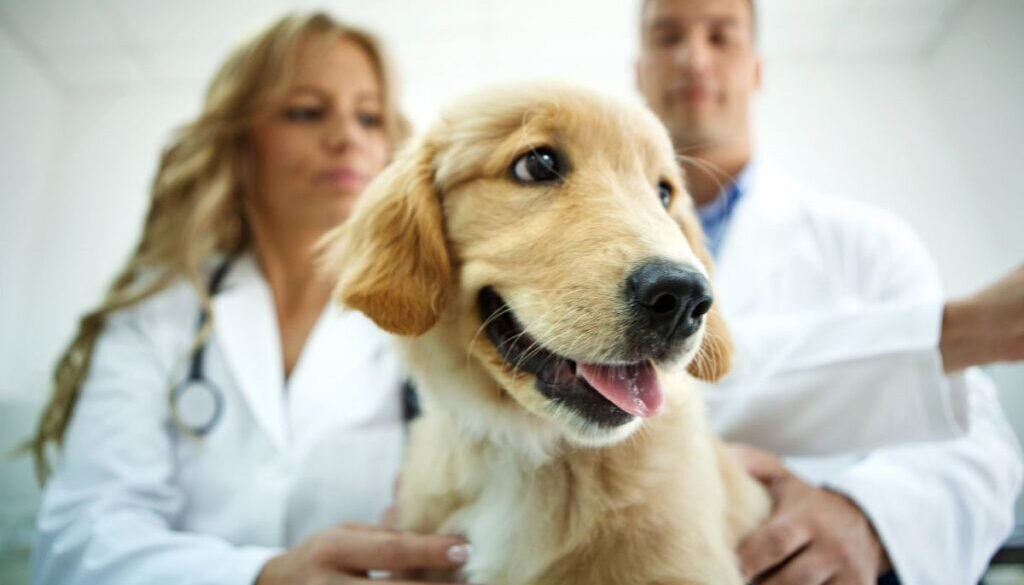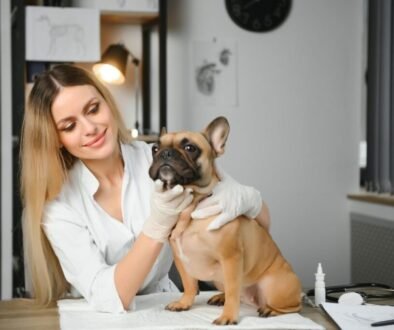Guide to Your Golden Retriever Puppy’s Vaccine Schedule: Keep Them Happy, Healthy, and Safe!
Why Vaccines Matter for Golden Retriever Puppies
Have you ever wondered what keeps your golden retriever puppy healthy enough to chase balls, wiggle their tails, and bring endless joy into your home? The answer lies not just in good food and love, but also in their vaccine schedule, which builds their immunity to harmful diseases.
For new pet parents, understanding the vaccine schedule can be overwhelming. What vaccines does your puppy need, and when? Are all vaccines equally important? The good news is this guide will break everything down for you, step by step.
Vaccinating your golden retriever puppy ensures they grow into the energetic, lovable companions you adore. Without vaccines, they are vulnerable to serious illnesses like parvovirus, distemper, and rabies. Parvovirus, for example, can have a fatality rate as high as 90% in untreated puppies. The good news? Vaccines make this entirely preventable.
Stick around to learn exactly how to protect your golden retriever puppy—and to avoid the heartache of preventable diseases.
What Makes Golden Retrievers Unique When It Comes to Vaccines?
Golden retrievers’ social nature and high energy levels make them more likely to encounter other dogs and environmental risks, which increases the importance of a timely vaccine schedule. Their friendly disposition means they’re often in contact with other pets or people, making them more susceptible to contagious diseases.
Key Health Considerations for Golden Retrievers:
- Susceptibility to Joint Issues: This breed is prone to hip and elbow dysplasia, which isn’t directly related to vaccines but underscores the importance of keeping them healthy.
- High Energy Levels: Golden retrievers are active dogs, and diseases like distemper can severely impact their energy and quality of life.
- Social Nature: Golden retrievers often interact with other dogs, which increases their exposure to contagious illnesses like kennel cough.
This makes following a strict vaccine schedule especially important for golden retriever puppies.
Core Vaccines vs. Non-Core Vaccines: What’s the Difference?
Vaccines fall into two categories: core vaccines and non-core vaccines.
Core Vaccines
These are essential for all dogs, regardless of their breed or lifestyle. Core vaccines protect against:
- Canine Distemper
- Parvovirus (CPV)
- Adenovirus (CAV-2)
- Rabies
These vaccines prevent life-threatening diseases and are often required by law (e.g., rabies).
Non-Core Vaccines
These are recommended based on your dog’s lifestyle and environment. For golden retrievers, these often include:
- Bordetella (kennel cough, common in social dogs)
- Leptospirosis (spread through contaminated water or soil)
- Lyme Disease (important for dogs in tick-heavy areas)
Your vet will guide you on which non-core vaccines are best for your golden retriever’s unique lifestyle.
The Golden Retriever Puppy Vaccine Schedule

Now that you understand why vaccines matter, let’s get into the nitty-gritty: when and what your golden retriever puppy needs.
Checklist: Prepare for Your Puppy’s Vaccine Appointments
- 📅 Schedule the appointment: Confirm dates for your puppy’s vaccine schedule with your veterinarian.
- 🛒 Pack essentials: Bring your puppy’s vaccination records, treats, and a favorite toy.
- 🐾 Comfort your puppy: Use a carrier or harness to ensure they feel safe and secure.
- ❓ Ask questions: Write down any questions about your puppy’s health or vaccines to discuss with your vet.
- 📖 Follow up: Take notes on your puppy’s next scheduled vaccine and post-visit care tips.
First Vaccines (6-8 Weeks)
The first set of vaccines is critical because puppies are born with immature immune systems. At this stage, your puppy will receive:
- DHPP Vaccine: This is a combination vaccine that protects against distemper, hepatitis, parainfluenza, and parvovirus.
- Optional: Bordetella, especially if you plan to board your puppy or attend puppy classes.
Your vet may also deworm your puppy during this visit to eliminate intestinal parasites.
Second Round (10-12 Weeks)
By this stage, your golden retriever’s immunity is building, but they still need more protection. The second set of vaccines includes:
- DHPP Booster
- Leptospirosis Vaccine (optional): For dogs exposed to standing water or rural environments.
Canine Influenza (optional): Protects against respiratory viruses in social settings.
Third Round (14-16 Weeks)
This is the final puppy vaccine appointment before moving to yearly boosters. Key vaccines include:
- Final DHPP Booster
- Rabies Vaccine: This is legally required in most states.
- Lyme Disease Vaccine (optional): Important if you live in a tick-heavy area.
Booster Shots and Annual Vaccines

Booster shots ensure your dog’s immunity stays strong over time. Core vaccines typically require boosters every 1-3 years, while non-core vaccines like Bordetella might need annual updates.
Common Vaccine Myths: Debunked!
Myth #1: “My puppy doesn’t need vaccines if they stay indoors.”
Even if your golden retriever spends most of their time indoors, they can still be exposed to airborne diseases or bacteria from shoes and clothes.
Myth #2: “Vaccines can harm my dog.”
Vaccines are thoroughly tested for safety and are vital to your puppy’s health. Side effects are rare and usually mild, such as a slight fever or fatigue.
Myth #3: “Once my puppy is vaccinated, they don’t need more shots.”
Immunity wanes over time. That’s why booster shots are essential to maintain protection.
Post-Vaccine Care: What to Watch For

After your puppy gets vaccinated, create a calm environment for them to rest. Offer their favorite blanket, ensure they have access to fresh water, and keep an eye out for any side effects like swelling or fatigue. Most puppies bounce back quickly, but if they seem unusually uncomfortable, give your vet a quick call for guidance. Common reactions include:
- Mild swelling or tenderness at the injection site
- Slight fatigue for a day or two
- A low-grade fever
When to Call the Vet
Contact your vet if your puppy experiences:
- Difficulty breathing
- Severe swelling or hives
- Persistent vomiting or diarrhea
Tips for a Stress-Free Vet Visit
- 🦴 Distract with treats: Bring high-value treats to reward your puppy and keep them focused.
- 🧸 Familiar toys: A favorite toy or blanket can provide comfort during the visit.
- 🐾 Positive reinforcement: Shower your puppy with praise and affection to create a positive association with the vet.
- 🕒 Time it right: Schedule appointments when your puppy is less likely to be hungry or tired.
How to Comfort Your Puppy After Vaccination

After a vaccination, your golden retriever puppy might feel a bit out of sorts. Here are some simple ways to soothe and comfort them during their recovery:
- 🛏️ Create a cozy space: Set up a quiet, comfortable area where your puppy can rest without disturbances.
- 🤗 Offer gentle cuddles: If your puppy seeks comfort, give them light cuddles or soothing pets, but avoid touching the injection site.
- 🦴 Provide a favorite treat: A small treat or chew toy can help distract and comfort them.
- 🕒 Monitor for 24 hours: Keep an eye on your puppy for signs of discomfort, swelling, or fatigue, and follow up with your vet if symptoms persist.
- 💧 Encourage hydration: Make sure fresh water is easily accessible to help them stay hydrated.
These small gestures not only soothe your puppy but also build positive associations with the vaccine experience, making future appointments less stressful.
Conclusion: The Key to a Healthy, Wagging Tail
Vaccinating your golden retriever puppy is one of the most important steps you can take to ensure a long, happy life. With the right schedule, you’re not just protecting your puppy—you’re also safeguarding the well-being of other dogs in your community.
A healthy golden retriever is a happy one, ready to chase tennis balls, snuggle on the couch, and brighten your days for years to come. Stay on top of their vaccines, and you’ll give them the best start in life.
FAQs: Your Puppy Vaccine Questions Answered
Q: How much do puppy vaccines cost?
A: Puppy vaccines typically cost $75-$150 per visit, but this range can vary depending on where you live and the veterinary clinic you visit. Urban areas may have higher costs compared to rural ones, and some clinics offer bundled packages that can reduce expenses. To get a precise estimate, contact local veterinarians in your area and ask about their vaccine schedules and pricing.
Q: Can I vaccinate my puppy myself?
A: While it’s technically possible to administer vaccines at home, it’s much safer and more effective to have them done by a veterinarian.
Q: What happens if I miss a vaccine?
A: Contact your vet immediately. They can help you catch up on missed vaccines without compromising your puppy’s immunity.
Q: Are vaccines required by law?
A: Rabies vaccination is required by law in most states. Other vaccines are highly recommended but not legally mandated.
Q: How do I know which non-core vaccines my puppy needs?
A: Your vet will recommend non-core vaccines based on your puppy’s lifestyle, environment, and exposure risks.
Q: How can I prepare for my puppy’s vaccine appointment?
A: Bring along your puppy’s medical records, a favorite toy for comfort, and some treats to reward them after the visit. Arriving a few minutes early can also help your puppy acclimate to the environment.
With this guide, you’re ready to tackle your golden retriever puppy’s vaccine schedule like a pro. Here’s to wagging tails and endless puppy kisses!



